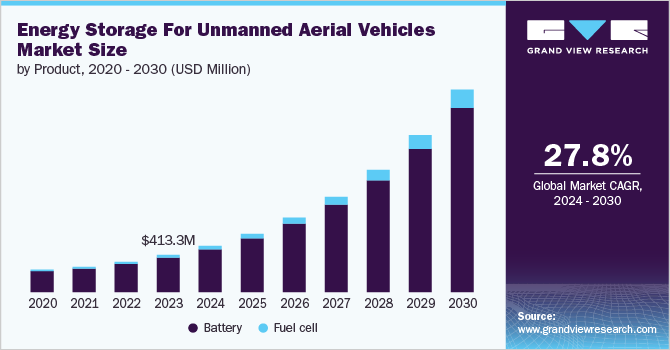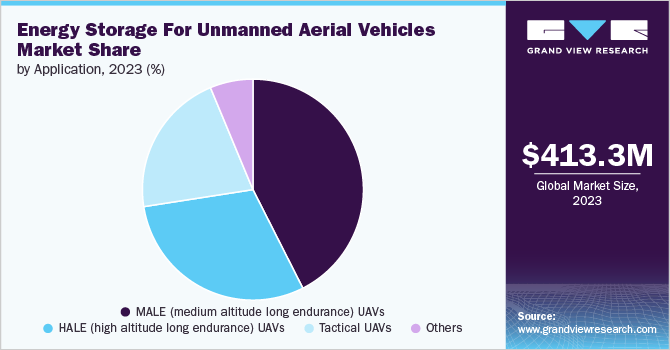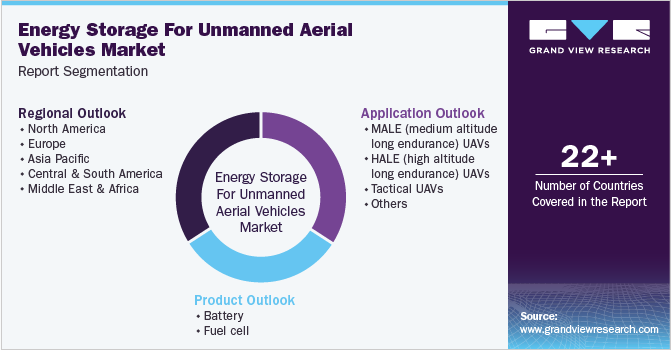- Home
- »
- Power Generation & Storage
- »
-
Energy Storage For Unmanned Aerial Vehicles Market Report, 2030GVR Report cover
![Energy Storage For Unmanned Aerial Vehicles Market Size, Share & Trends Report]()
Energy Storage For Unmanned Aerial Vehicles Market Size, Share & Trends Analysis Report By Product (Battery, Fuel Cell), By Application (MALE, Tactical UAVs), By Region, And Segment Forecasts, 2024 - 2030
- Report ID: GVR-4-68040-423-6
- Number of Report Pages: 180
- Format: PDF, Horizon Databook
- Historical Range: 2018 - 2023
- Forecast Period: 2024 - 2030
- Industry: Energy & Power
Market Size & Trends
The global energy storage for unmanned aerial vehicles market size was estimated at USD 413.25 million in 2023 and is expected to grow at a CAGR of 27.8% from 2024 to 2030. The market is experiencing significant growth driven by several key factors. First, the increasing demand for drones across various sectors-including logistics, agriculture, surveillance, and defense-has heightened the need for efficient energy storage solutions. As UAV applications expand, particularly in commercial and urban air mobility, the limitations of current battery technologies, such as their charge capacity and weight, have become more pronounced.

Moreover, advancements in smart battery technologies and hybrid power systems fosters market growth. Manufacturers are investing heavily in research and development to enhance the performance of lithium-ion batteries and explore alternatives like hydrogen fuel cells and supercapacitors. These innovations aim to improve energy efficiency, reduce size, and increase the payload capacity of drones, making them more viable for long-endurance missions.
Drivers, Opportunities & Restraints
Environmental considerations also play a crucial role in driving the market. The aviation industry is under pressure to adopt greener technologies, and electric propulsion systems powered by renewable energy sources are becoming increasingly attractive. Energy storage systems that support these technologies are essential for reducing emissions and improving sustainability in UAV operations.
The market faces several restraints that could hinder its growth and development. One of the primary challenges is the limited energy density of current battery technologies, particularly lithium-ion batteries, which restricts the flight time and operational range of UAVs. Despite ongoing advancements, these batteries still struggle to meet the increasing demands for longer endurance and heavier payloads, leading to constraints in practical applications.
Strategic partnerships and collaborations among key stakeholders, including technology providers and UAV manufacturers, are also fostering innovation and accelerating market growth. These alliances can facilitate the development of next-generation energy storage solutions tailored to specific UAV applications, enhancing performance and reliability.
Product Insights
Battery held the largest revenue share of 92.76% in 2023. The market is driven by the increasing demand for drones across various sectors, advancements in smart battery technologies, and environmental considerations. The growing use of UAVs in logistics, agriculture, surveillance, and defense has heightened the need for efficient energy storage solutions.
Manufacturers are investing in research to enhance lithium-ion batteries and explore alternatives like hydrogen fuel cells and supercapacitors, aiming to improve energy efficiency and increase payload capacity. Additionally, the aviation industry's push for greener technologies and the growing acceptance of drones in urban settings are contributing to market expansion.
Application Insights
The MALE (medium altitude long endurance) UAVs segment held the largest revenue share of 42.54% in 2023. Innovations in battery systems, particularly lithium-ion and fuel cell technologies, are improving energy density and efficiency, enabling MALE UAVs to operate for extended periods without frequent recharging. Additionally, the integration of artificial intelligence in UAV operations enhances mission capabilities, further driving the need for robust energy storage solutions to support complex tasks and real-time data processing.

The energy storage for tactical unmanned aerial vehicles (UAVs) is driven by the increasing adoption of these UAVs for military and homeland security applications, such as reconnaissance, surveillance, and target acquisition. Tactical UAVs require reliable and efficient battery technologies that can provide extended flight times and rapid recharging capabilities to support their missions. Advancements in lithium-ion and fuel cell technologies are enhancing energy density and efficiency, enabling tactical UAVs to operate for longer durations without compromising payload capacity. Additionally, the integration of artificial intelligence and autonomous systems in tactical UAVs is driving the need for advanced energy storage solutions that can handle complex mission profiles and real-time data processing requirements.
Regional Insights
North America energy storage for unmanned aerial vehicles market dominated the global market and accounted for the largest revenue share of over 43.28% in 2023. The North American market is driven by several compelling factors. The increasing adoption of UAVs in military, commercial, and industrial applications has heightened the demand for advanced battery technologies that provide longer flight times and improved efficiency. The integration of artificial intelligence in autonomous UAVs enhances operational capabilities, necessitating more sophisticated energy storage solutions to support complex missions.
U.S. Energy Storage For Unmanned Aerial Vehicles Market Trends
The energy storage for unmanned aerial vehicles (UAVs) market in the U.S. is driven by several key factors, including the increasing demand for advanced UAV applications in military, commercial, and industrial sectors. The growing reliance on UAVs for tasks such as surveillance, reconnaissance, and logistics necessitates the development of high-performance battery technologies that provide longer flight times and enhanced reliability.
Europe Energy Storage For Unmanned Aerial Vehicles Market Trends
The Europe energy storage for unmanned aerial vehicles (UAVs) market is driven by several key factors. The increasing adoption of UAVs for various applications, including surveillance, agriculture, and logistics, has heightened the demand for advanced battery technologies that offer longer flight times and improved efficiency. Additionally, the European Union's emphasis on sustainability and environmental regulations is pushing manufacturers to develop greener energy storage solutions, such as lithium-ion and hydrogen fuel cells.
The energy storage for unmanned aerial vehicles (UAVs) market in Germany is driven significantly by the Country’s emphasis on sustainability and environmental regulations. This is pushing manufacturers to develop greener energy storage solutions, such as lithium-ion and hydrogen fuel cells. The integration of artificial intelligence in UAV operations further enhances their capabilities, driving the need for robust energy storage systems. Moreover, strategic partnerships among industry players are fostering innovation, which is expected to accelerate market growth in the country.
The UK energy storage for unmanned aerial vehicles market is driven by the government’s commitment to innovation and sustainability. This further encourages the development of greener energy storage solutions, such as lithium-ion and hydrogen fuel cells. The integration of artificial intelligence in UAV operations further enhances their capabilities, driving the need for robust energy storage systems. Moreover, strategic partnerships among industry players are fostering technological advancements, positioning the UK as a significant player in the UAV energy storage market.
Asia Pacific Energy Storage For Unmanned Aerial Vehicles Market Trends
The rapid advancements in drone technology in the Asia Pacific, such as artificial intelligence and autonomous systems, enhance UAV capabilities, further driving the demand for robust energy storage solutions. Government initiatives promoting UAV applications, along with strategic partnerships among industry players, are also contributing to market growth. Furthermore, the region's focus on sustainability and the development of greener energy storage options, such as hydrogen fuel cells, are expected to bolster the market significantly.
China energy storage for unmanned aerial vehicles (UAVs) market is driven by the rapid growth of the UAV industry, fueled by increasing applications in agriculture, logistics, and surveillance, creating strong demand for advanced battery technologies that enhance flight duration and efficiency.
The energy storage for unmanned aerial vehicles (UAVs) market in Japan is driven by the increasing adoption of UAVs for various applications, such as agriculture, infrastructure inspection, and disaster response, creating a strong demand for advanced battery technologies that enhance flight duration and efficiency. Additionally, the focus on sustainability is pushing manufacturers to develop greener energy storage solutions, such as lithium-ion and hydrogen fuel cells, to meet environmental regulations and support the growth of the UAV industry in the country.
Central & South America Energy Storage For Unmanned Aerial Vehicles Market Trends
The Central and South America energy storage for unmanned aerial vehicles (UAVs) market is driven by the increasing demand for UAV applications in agriculture, logistics, and environmental monitoring. The region's focus on improving agricultural efficiency and monitoring natural resources is propelling the adoption of advanced battery technologies that enhance flight duration and operational capabilities. Additionally, government initiatives promoting sustainable practices, and the integration of renewable energy sources are encouraging investments in energy storage solutions. The growing interest in drone technology for disaster response and infrastructure inspection further contributes to market growth, creating a robust demand for reliable energy storage systems.
Middle East & Africa Energy Storage For Unmanned Aerial Vehicles Market Trends
The energy storage for unmanned aerial vehicles (UAVs) market in the Middle East and Africa is driven by the increasing adoption of UAVs for military, agricultural, and logistics applications, coupled with advancements in battery technologies that enhance flight duration and operational efficiency.
Key Energy Storage For Unmanned Aerial Vehicles Company Insights
The market is characterized by intense competition among several key players globally, each striving to innovate and capture market share. Major companies are leading the charge by developing advanced battery technologies, including lithium-ion and hydrogen fuel cells, to meet the growing demand for efficient energy storage solutions.
Key Energy Storage For Unmanned Aerial Vehicles Companies:
The following are the leading companies in the energy storage for unmanned aerial vehicles market. These companies collectively hold the largest market share and dictate industry trends.
- Amperex Technology
- Ballard Power Systems
- DJI
- Highpower International
- Kokam
- Grepow
- H3 Dynamics
- Intelligent Energy
- Lumenier
- MicroMultiCopter Aero Technology
Recent Developments
-
In June 2024, FlyingBasket partnered with Molicel for the development of batteries for the next-generation fb3 cargo drone. The partnership will enhance the capabilities of FB3 drone with 9% more flight range and payload capacity of 100 kg which will boost the logistical operations.
-
In April 2024, Avy announced the integration of the smart battery of Tulip in UAVs, a manufacturer of aviation battery technology. The battery is capable of increasing 80% to 100% longer flight by 1.5 to 2 hours.
Energy Storage For Unmanned Aerial Vehicles Market Report Scope
Report Attribute
Details
Market size value in 2024
USD 514.12 million
Revenue forecast in 2030
USD 2.24 billion
Growth rate
CAGR of 27.8% from 2024 to 2030
Actual data
2018 - 2023
Forecast period
2024 - 2030
Quantitative units
Revenue in USD million/billion and CAGR from 2024 to 2030
Report coverage
Revenue forecast, competitive landscape, growth factors, and trends
Segments covered
Product, application, region
Regional scope
North America; Europe; Asia Pacific; Central & South America; Middle East & Africa
Country Scope
U.S.; Canada; Mexico; Germany; France; UK; Italy; Spain; Russia; China; India; Japan; Australia; Brazil; Argentina; Saudi Arabia; South Africa; UAE
Key companies profiled
Amperex Technology, Ballard Power Systems, DJI, Highpower International, Kokam, Grepow, H3 Dynamics, Intelligent Energy, Lumenier, MicroMultiCopter Aero Technology
Customization scope
Free report customization (equivalent up to 8 analyst’s working days) with purchase. Addition or alteration to country, regional & segment scope
Pricing and purchase options
Avail customized purchase options to meet your exact research needs. Explore purchase options
Global Energy Storage For Unmanned Aerial Vehicles Market Report Segmentation
This report forecasts revenue growth at global, regional, and country levels and provides an analysis of the latest industry trends in each of the sub-segments from 2018 to 2030. For this study, Grand View Research has segmented the global energy storage for unmanned aerial vehicles market report based on the product, application, and region:

-
Product Outlook (Revenue, USD Million, 2018 - 2030)
-
Battery
-
Fuel cell
-
-
Application Outlook (Revenue, USD Million, 2018 - 2030)
-
MALE (medium altitude long endurance) UAVs
-
HALE (high altitude long endurance) UAVs
-
Tactical UAVs
-
Others
-
-
Regional Outlook (Revenue, USD Million, 2018 - 2030)
-
North America
-
U.S.
-
Canada
-
Mexico
-
-
Europe
-
Germany
-
UK
-
Italy
-
Spain
-
France
-
Russia
-
-
Asia Pacific
-
China
-
India
-
Japan
-
Australia
-
-
Central & South America
-
Brazil
-
Argentina
-
-
Middle East & Africa
-
Saudi Arabia
-
South Africa
-
UAE
-
-
Frequently Asked Questions About This Report
b. The global energy storage for unmanned aerial vehicles market size was valued at USD 413.25 million in 2023 and is expected to reach USD 514.12 million in 2024.
b. The global energy storage for unmanned aerial vehicles market is expected to grow at a compound annual growth rate (CAGR) of 27.8% from 2024 to 2030 to reach USD 2.24 billion by 2030.
b. The Battery segment accounted for the largest share of 92.76% in the global Energy Storage Market For Unmanned Aerial Vehicles market in 2023. The energy storage market for unmanned aerial vehicles (UAVs) is driven by the increasing demand for drones across various sectors, advancements in smart battery technologies, and environmental considerations.
b. The energy storage for unmanned aerial vehicles market is a concentrated market where major companies such as Amperex Technology, Ballard Power Systems, DJI, Highpower International, Kokam, Grepow.
b. The energy storage market for unmanned aerial vehicles (UAVs) is experiencing significant growth driven by several key factors. First, the increasing demand for drones across various sectors—including logistics, agriculture, surveillance, and defense—has heightened the need for efficient energy storage solutions.
Share this report with your colleague or friend.
![gvr icn]()
NEED A CUSTOM REPORT?
We can customize every report - free of charge - including purchasing stand-alone sections or country-level reports, as well as offer affordable discounts for start-ups & universities. Contact us now
![Certified Icon]()
We are GDPR and CCPA compliant! Your transaction & personal information is safe and secure. For more details, please read our privacy policy.
We are committed towards customer satisfaction, and quality service.
"The quality of research they have done for us has been excellent."





